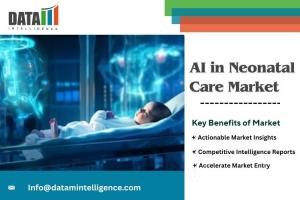Future of AI in Neonatal Care Market | Global Market Trends - DataM Intelligence
AI in Neonatal Care Market is growing rapidly due to rising preterm births, early diagnosis needs, and AI adoption in NICUs for better newborn outcomes.
The global healthcare sector is undergoing a digital transformation, and one of the most promising areas is the integration of artificial intelligence (AI) in neonatal care. This market is experiencing remarkable growth, driven by technological advancements, rising neonatal complications, and an urgent need for early diagnosis and precise monitoring of newborns. With AI stepping in to enhance neonatal outcomes, hospitals and clinics are shifting toward smarter, data-driven care models.
Market Value and Growth Trends
The AI in Neonatal Care Market 2024 is anticipated to reach significant figures by the end of 2025, growing at a robust CAGR throughout the forecast period. The surge in premature births, increased incidence of low birth weight, and rising healthcare expenditures are pushing hospitals to adopt AI-powered solutions for neonatal monitoring, diagnostics, and decision-making.
Neonatal intensive care units (NICUs) are rapidly integrating AI to support early detection of life-threatening conditions such as sepsis, respiratory distress syndrome, and congenital anomalies. With AI algorithms analyzing data from wearable monitors, imaging tools, and medical records, healthcare providers can detect abnormalities even before symptoms become critical.
In addition, AI-based predictive analytics tools are being deployed to assess the risk of complications and personalize treatment pathways for newborns. This not only improves outcomes but also reduces the burden on NICU staff and resources.
To Download Sample Report: https://www.datamintelligence.com/download-sample/ai-in-neonatal-care-market
Regional Outlook
North America
North America continues to dominate the market, with the United States at the forefront of AI adoption in neonatal care. High healthcare spending, a robust infrastructure, and major investments in AI research have enabled early deployment of AI systems in hospitals. Startups and leading healthcare technology firms in the U.S. are developing solutions to monitor vital signs, analyze neonatal imaging, and predict medical emergencies with enhanced accuracy.
Europe
Europe is also witnessing a steady rise in AI applications in neonatal care, particularly in countries like Germany, France, and the UK. Public and private healthcare providers are working together to deploy AI for early detection of neonatal conditions. Moreover, supportive government policies and collaborative research programs are driving innovation across NICUs.
Asia-Pacific
The Asia-Pacific region is rapidly establishing itself as a significant contender in this market. Countries such as Japan, China, and India are experiencing increasing awareness about AI in pediatric and neonatal care. Growing population, government investment in digital healthcare, and the presence of technology companies are creating a fertile environment for market expansion.
Key Companies in the Market
IBM
Sibel Health, Inc.
CuboAi
Invidyo
CergenX
Snorble
LittleOne.Care
Bloom Standard
Wadhwani AI
Maxi-Cosi
Market Segmentation
By Product: Thermoregulation Devices , Radiant Warmers, Neonatal Incubators , Neonatal Cooling Systems, Monitoring Systems , Vital Signs Monitors, Brain Monitoring Systems , Blood Gas Monitoring Systems , Phototherapy Equipment, LED and CFL Phototherapy Units , Phototherapy Eye Masks , Ventilation Systems , Screening Devices , Others
By Application: Neonatal Hypothermia & Low Birth Weight, Jaundice , Gastrointestinal Diseases, Respiratory Diseases, Retinopathy , Sepsis, Others
By End-User: Hospitals, Pediatric and Neonatal Clinics, Nursing Homes , Others
These companies are not only launching new products but also forming partnerships with hospitals and research institutions to bring AI solutions to the forefront of neonatal care.
Latest News of USA
In early 2025, a leading U.S. hospital network in collaboration with a tech startup launched an AI-enabled early warning system for neonatal sepsis. This system analyzes real-time data from wearable monitors and electronic health records to predict infection risk hours before symptoms appear. According to hospital officials, the tool has already reduced sepsis-related complications in NICUs by over 20% within the first quarter of use.
Meanwhile, the U.S. Food and Drug Administration (FDA) recently approved a new AI-based diagnostic platform specifically designed for use in NICUs. The system leverages deep learning algorithms to interpret imaging scans and detect anomalies in the brain, heart, and lungs of preterm infants. This marks a major regulatory milestone and opens the door for wider clinical adoption across the country.
Latest News of Japan
In 2025, Japan initiated a nationwide pilot program that implemented AI technologies across more than 100 neonatal intensive care units (NICUs). Spearheaded by the Ministry of Health, this initiative aims to standardize AI use in neonatal diagnostics and care management. The program focuses on real-time monitoring of newborns with AI interpreting physiological signals to alert caregivers about potential risks.
Moreover, a leading Japanese university hospital developed an AI-driven app for neonatal nutrition management. This app assists clinicians in creating personalized feeding plans for premature infants based on AI analysis of growth metrics and metabolic data. Early feedback from the medical community highlights improved weight gain and reduced nutritional complications.
Conclusion
The AI in neonatal care market is not just a technological advancement it's a lifesaving innovation. With a growing demand for precision medicine and early intervention in neonatal care, AI solutions are playing an instrumental role in reshaping clinical practices. The integration of AI enables better monitoring, early diagnosis, and personalized treatment plans for newborns, ultimately reducing neonatal mortality and long-term health issues.
As countries like the United States and Japan continue to push boundaries with research, policy, and innovation, the global AI in neonatal care market is set to flourish. With promising developments on the horizon, AI is quickly becoming an indispensable ally in the quest for better newborn health outcomes.
Stay informed with the latest industry insights-start your subscription now: https://www.datamintelligence.com/reports-subscription
Most Recent Trending Related Reports By DataM intelligence
Neonatal Care Equipment Market Size By 2031
Neonatal Point of Care Testing Market Size By 2031
Sai Kiran
DataM Intelligence 4Market Research
+1 877-441-4866
Sai.k@datamintelligence.com
Visit us on social media:
LinkedIn
X
Legal Disclaimer:
EIN Presswire provides this news content "as is" without warranty of any kind. We do not accept any responsibility or liability for the accuracy, content, images, videos, licenses, completeness, legality, or reliability of the information contained in this article. If you have any complaints or copyright issues related to this article, kindly contact the author above.
GlassesUSA.com teams up with pop-star Shenseea to celebrate bold, personal summer style
Ván Cờ AI Trị Giá 510 Tỷ USD Của Đài Loan Báo Hiệu Kỷ Nguyên Mới Về Chủ Quyền Công Nghệ
EBC Financial Group:台湾の5,100億ドル規模のAI投資は、テクノロジー主権の新時代を予感させる
Więcej ważnych informacji
 Jedynka Newserii
Jedynka Newserii

 Jedynka Newserii
Jedynka Newserii

Ochrona środowiska

A. Bryłka (Konfederacja): Ograniczenie emisyjności nie musi się odbywać za pomocą celów klimatycznych. Są absurdalne, nierealne i niszczące europejską gospodarkę
W lipcu br. Komisja Europejska ogłosiła propozycję nowego celu klimatycznego, który zakłada ograniczenie emisji gazów cieplarnianych o 90 proc. do 2040 roku w porównaniu do stanu z 1990 roku. Został on zaproponowany bez zgody państw członkowskich, w przeciwieństwie do poprzednich celów na 2030 i 2050 rok. Polscy europarlamentarzyści uważają ochronę środowiska i zmiany w jej zakresie za potrzebne, jednak nie powinny się odbywać za pomocą nieosiągalnych celów klimatycznych.
Polityka
Dramatyczna sytuacja ludności w Strefie Gazy. Pilnie potrzebna dobrze zorganizowana pomoc humanitarna

Według danych organizacji Nutrition Cluster w Strefie Gazy w lipcu br. u prawie 12 tys. dzieci poniżej piątego roku życia stwierdzono ostre niedożywienie. To najwyższa miesięczna liczba odnotowana do tej pory. Mimo zniesienia całkowitej blokady Strefy Gazy sytuacja w dalszym ciągu jest dramatyczna, a z każdym dniem się pogarsza. Przedstawiciele Polskiej Akcji Humanitarnej uważają, że potrzebna jest natychmiastowa pomoc, która musi być dostosowana do aktualnych potrzeb poszkodowanych i wsparta przez stronę izraelską.
Polityka
Wśród Polaków rośnie zainteresowanie produktami emerytalnymi. Coraz chętniej wpłacają oszczędności na konta IKE i IKZE

Wzrosła liczba osób, które oszczędzają na cele emerytalne, jak również wartość zgromadzonych środków. Liczba uczestników systemu emerytalnego wyniosła w 2024 roku ponad 20,8 mln osób, a wartość aktywów – 307,5 mld zł – wynika z najnowszych danych Urzędu Komisji Nadzoru Finansowego (UKNF). Wyraźny wzrost odnotowano w przypadku rachunków IKE i IKZE, na których korzyść działają m.in. zachęty podatkowe. Wpłacane na nie oszczędności są inwestowane, a tym samym wspierają gospodarkę i mogą przynosić atrakcyjną stopę zwrotu.
Partner serwisu
Szkolenia

Akademia Newserii
Akademia Newserii to projekt, w ramach którego najlepsi polscy dziennikarze biznesowi, giełdowi oraz lifestylowi, a także szkoleniowcy z wieloletnim doświadczeniem dzielą się swoją wiedzą nt. pracy z mediami.









.gif)

 |
| |
| |
|